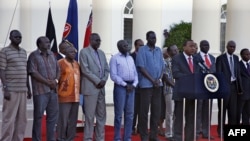NAIROBI —
Seven former political detainees from South Sudan arrived in the Ethiopian capital Addis Ababa on Wednesday to join talks aimed at resolving the crisis in the world's newest nation, a spokesman for anti-government negotiators told VOA.
Yahanis Musa Pouk said by phone that the team of seven former detainees arrived in Addis Ababa from Nairobi Wednesday evening.
Opposition negotiators had threatened to boycott the second round of talks unless several demands were met, including that the former detainees, who were released to the custody of the Kenyan president in late January, be allowed to travel to Ethiopia to take part in the negotiations.
The opposition withdrew its boycott threat after Intergovernmental Authority on Development (IGAD) mediators assured them that the seven would be allowed to attend the talks.
Before they travelled to Ethiopia on Wednesday, the seven were joined by the widow of John Garang, the founder of what is now South Sudan's ruling SPLM party, and met with Kenyan President Uhuru Kenyatta, the Kenyan presidency said in a statement.
Garang's widow, Rebecca Nyandeng, who is herself a high-ranking member of the SPLM, said the former detainees' participation at the talks was crucial to resolving the crisis in South Sudan, where thousands are said to have been killed and nearly one million displaced in two months of fighting.
Nyandeng called on Kenyatta to put more pressure on the South Sudanese government to release four other SPLM members who have been in detention in Juba since the unrest began in mid-December.
The government of South Sudan says it has enough evidence to charge the four remaining detainees and three other political figures, including former vice president Riek Machar, with treason, and will not release them until they have gone through the full legal process.
President Salva Kiir has blamed the violence in South Sudan on a failed coup bid on Dec. 15, that he says was masterminded by Machar and a group of around a dozen SPLM members.
Machar and the others who have been accused of treason by the government deny that they had anything to do with the violence or an alleged coup.
Under the terms of an agreement signed at the end of January between the warring sides, the release of all 11 detainees was supposed to be expedited.
In a statement released last week, the U.S. State Department urged the government of South Sudan to "release the remaining four political detainees."
"The expeditious release and transfer of all of the detainees would reduce tension and build confidence in an inclusive reconciliation process," State Department spokeswoman Jen Psaki said.
The second round of talks for South Sudan is supposed to focus on reconciliation and building a political dialogue between the two sides. But the talks are taking place against the backdrop of ongoing fighting in parts of South Sudan, including in Machar's hometown of Leer and in oil-rich Upper Nile state.
John Tanza and Karin Zeitvogel contributed to this story from Washington.
Yahanis Musa Pouk said by phone that the team of seven former detainees arrived in Addis Ababa from Nairobi Wednesday evening.
Opposition negotiators had threatened to boycott the second round of talks unless several demands were met, including that the former detainees, who were released to the custody of the Kenyan president in late January, be allowed to travel to Ethiopia to take part in the negotiations.
The opposition withdrew its boycott threat after Intergovernmental Authority on Development (IGAD) mediators assured them that the seven would be allowed to attend the talks.
Before they travelled to Ethiopia on Wednesday, the seven were joined by the widow of John Garang, the founder of what is now South Sudan's ruling SPLM party, and met with Kenyan President Uhuru Kenyatta, the Kenyan presidency said in a statement.
Garang's widow, Rebecca Nyandeng, who is herself a high-ranking member of the SPLM, said the former detainees' participation at the talks was crucial to resolving the crisis in South Sudan, where thousands are said to have been killed and nearly one million displaced in two months of fighting.
Nyandeng called on Kenyatta to put more pressure on the South Sudanese government to release four other SPLM members who have been in detention in Juba since the unrest began in mid-December.
The government of South Sudan says it has enough evidence to charge the four remaining detainees and three other political figures, including former vice president Riek Machar, with treason, and will not release them until they have gone through the full legal process.
President Salva Kiir has blamed the violence in South Sudan on a failed coup bid on Dec. 15, that he says was masterminded by Machar and a group of around a dozen SPLM members.
Machar and the others who have been accused of treason by the government deny that they had anything to do with the violence or an alleged coup.
Under the terms of an agreement signed at the end of January between the warring sides, the release of all 11 detainees was supposed to be expedited.
In a statement released last week, the U.S. State Department urged the government of South Sudan to "release the remaining four political detainees."
"The expeditious release and transfer of all of the detainees would reduce tension and build confidence in an inclusive reconciliation process," State Department spokeswoman Jen Psaki said.
The second round of talks for South Sudan is supposed to focus on reconciliation and building a political dialogue between the two sides. But the talks are taking place against the backdrop of ongoing fighting in parts of South Sudan, including in Machar's hometown of Leer and in oil-rich Upper Nile state.
John Tanza and Karin Zeitvogel contributed to this story from Washington.






